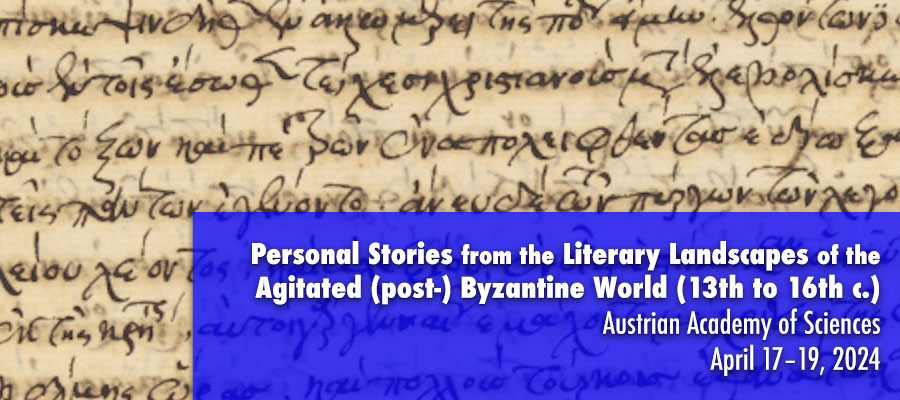Personal Stories from the Literary Landscapes of the Agitated (post-) Byzantine World (13th to 16th c.), Austrian Academy of Sciences, April 17–19, 2024
Personal stories in rhetoricized texts (such as letters, poems, or orations) are important source material for the writing of history on a microlevel in medieval studies, as they are often the only detailed accounts of individuals describing the world they lived in that remain to us. More than the large-scale historiographical narratives, they offer us precious glimpses into specific historical moments and what they meant to various individuals. At the same time, writing in the Middle Ages was often highly formalized – a fact that holds especially true for the transmitted texts. When occasional texts entered the manuscript tradition, they were often adapted: they sometimes lost traces of their quotidian character (such as concrete forms of address, names, or even the main ‘message’). What we have today is either what medieval readers considered worthy of preservation for future generations, or what has survived by chance. Hence, every personal text must be read between the poles of documentary evidence (or factuality) and literary work (with a certain degree of fictionalization).
This conference aims to look at texts telling personal stories from the later Middle Ages, taking as its starting point the (formerly) Byzantine territories in the European East and Anatolia. At the end of the twelfth century, the southern Balkans including mainland Greece, the western portions of Anatolia, and the eastern Mediterranean islands had formed a relatively coherent cultural space for many centuries, dominated by the Byzantine Empire, its Orthodox religion, and the Greek language. When in 1204 the Crusaders captured Constantinople, this cultural and political coherence vanished for good. The following centuries saw numerous political subversions and social dislocations in this area, which resulted in an increased cultural entanglement: the proliferation of religious encounters between Christians and Muslims, or between the various Christian churches; the profound reordering of patronage networks; and a new linguistic diversity. By the mid-16th century, political and cultural supremacy had passed definitively from the Byzantines to the Ottoman Empire.
While several scholarly disciplines (such as Byzantine Studies, Middle Eastern Studies, Medieval Studies etc.) have worked on individual authors and texts from this period and space, there are as yet only a few endeavours which have treated the area described here as a literary landscape best understood from the perspectives of various linguistic and cultural traditions. This conference thus has a deeply interdisciplinary focus and intends to include papers on a wide range of languages (such as Greek, Persian, Arabic, Ottoman Turkic, Latin, Romance languages, Armenian, Georgian, Slavonic languages, Hebrew). Guiding questions will evolve around the following (non-exhaustive) list of topics:
Change, disruption, and stability in the literary landscape
- How were political and social changes displayed in the literary works produced in this space? How was literature used to actively shape the society in which it was produced?
- How did persons from different cultural backgrounds reflect on the same events (e.g. the sack of Constantinople in 1204 or the Ottoman capture of the city in 1453)?
- How did direct intercultural contact influence the works of authors from different backgrounds?
- What traces did the change of power relations leave on literary works?
Personal Stories
- Which concepts of authorship are put forward in theoretical texts (e.g. rhetorical school books) and how are they put into practice in different cultures?
- How are ‘minor’ literary forms (e.g. letters, orations, poems, etc.) situated between fictionality and factuality?
Writing literary history in the 21st century:
- What do we gain from writing the literary history of a region (a literary landscape) – rather than that of a nation or a linguistic tradition)?
- How does modern historiography benefit from literary theory?
- How do different comparative approaches (especially the study of direct cultural encounters vs. structural comparisons) complement each other?
The conference will take place in Vienna with a strong preference for the in-person attendance of the participants. There will, however, be the option to join online.
Organizer: Dr Krystina Kubina, Austrian Academy of Sciences
This conference is organized within the framework of the project “The Power of Poetry in Late Byzantium: Aesthetic Values and Social Impact” (project no. V919) funded by the Austrian Science Fund FWF.
